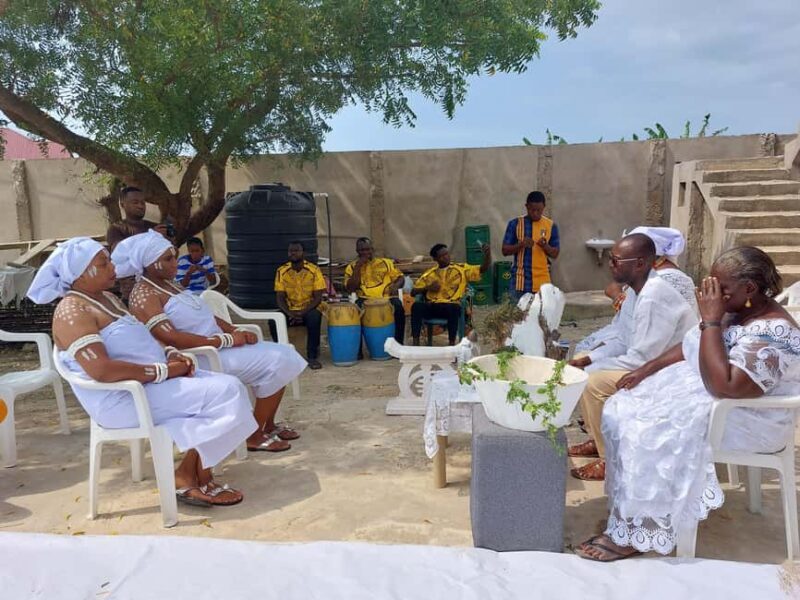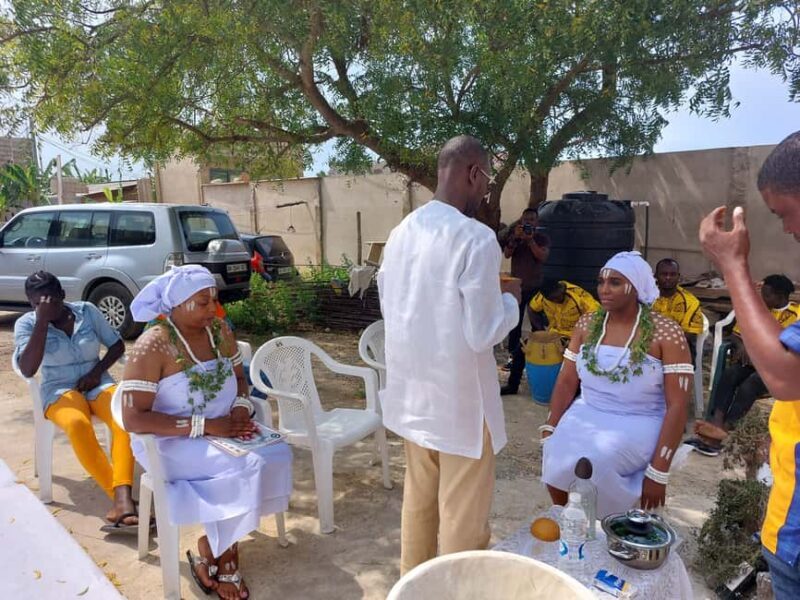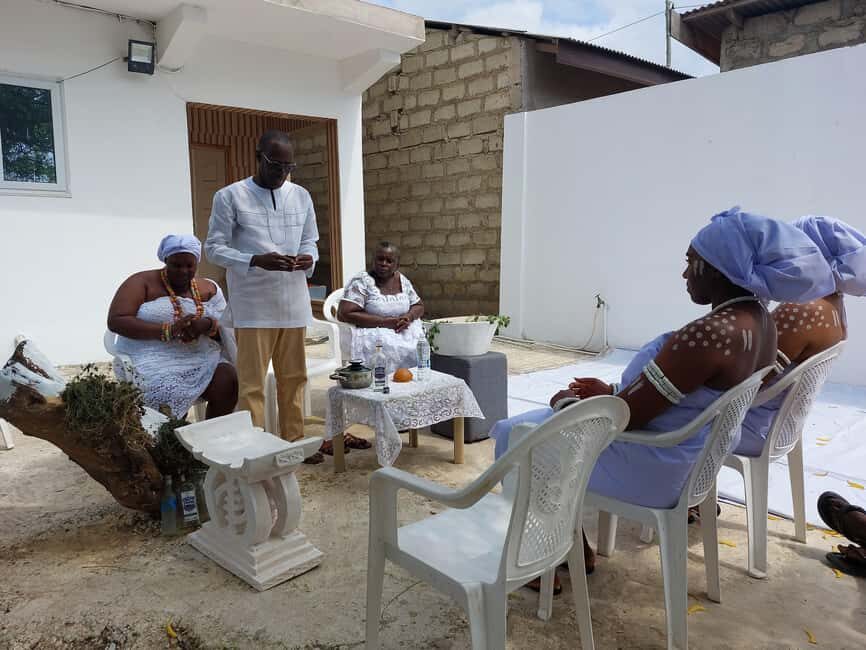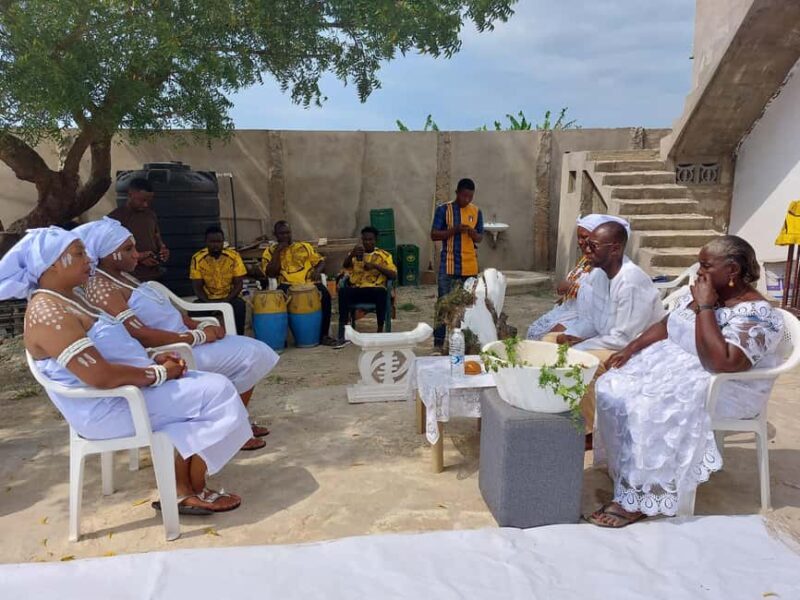Akan Naming Ceremony at Slave River Site & Cape Coast Tour: A Deep Dive into Ghana’s Heritage
Traveling to Ghana offers a powerful opportunity to connect with history, culture, and personal identity. This tour, offered by PP Travel Gh Tours, combines a poignant visit to the Assin Manso Slave River and Cape Coast Castle with a traditional Akan Naming Ceremony. It’s a journey that balances storytelling, personal reflection, and culture — all in one day.
What makes this experience standout are three notable aspects: the chance to participate in a genuine Akan Naming Ceremony, the moving visit to the last bath site for enslaved Africans, and the exploration of Cape Coast Castle’s historic dungeons. These elements deliver more than just sightseeing — they foster understanding on a deeply personal level.
One potential consideration is the full-day schedule, which involves a lot of walking and outdoor exposure. Travelers should be prepared for sun and heat, especially at the sites with little shade.
This tour is best suited for those interested in history, culture, and meaningful personal experiences. It’s ideal for travelers who want to learn about Ghana’s past while engaging with its living traditions.
Key Points

- Cultural Immersion: Participate in an authentic Akan Naming Ceremony, gaining a personal name based on your birth day.
- Historical Significance: Visit the last bath river site and the former slave market, understanding the journey of enslaved Africans.
- Educational Tour: Explore Cape Coast Castle’s dungeons, condemn cells, and the Door of No Return, learning the stark realities of the slave trade.
- Emotional Experience: The ceremony and site visits foster a respectful reflection on history and personal identity.
- Value for Money: At $450, the tour covers transportation, guidance, cultural participation, and historical insights — a comprehensive package.
- Practical Details: Expect comfortable transportation from Accra, a live English-speaking guide, and a flexible booking with free cancellation up to 24 hours in advance.
An In-depth Look at the Experience

Starting with the Assin Manso Slave River Site
The journey begins early in the morning with a pickup from your Accra hotel. The drive to Assin Manso takes roughly a few hours, giving travelers a scenic glimpse of Ghana’s countryside. The first stop is at the Slave River Site, a location that carries layers of history and emotion. Here, you’ll witness the last bath site where enslaved Africans were washed before being sold or shipped out — a profoundly sobering reminder of the brutal past.
According to reviews, the site is well-maintained and respectful. Visitors notice the solemn atmosphere, with many choosing to reflect quietly or pay homage at the tombs of slaves returned from places like Jamaica, Barbados, and New York. One reviewer noted, “It’s a deeply moving place, and the guide’s explanations helped me truly grasp what these people endured.” The site’s significance is amplified by its status as a symbolic gateway of liberation and remembrance.
Participating in the Akan Naming Ceremony
After exploring the site, you’ll partake in an Akan Naming Ceremony — a tradition rooted in Ghanaian culture. Donning traditional attire, you’ll be named based on the day of the week you were born, with explanations about how these names relate to personality traits and life purpose. This personalized naming leaves a tangible mark, as you’ll receive a certificate and cultural paraphernalia as keepsakes.
Guests have described this part of the tour as unexpectedly warm and engaging. One reviewer said, “I loved learning my Ghanaian name and the stories behind it — it made me feel connected to my roots.” The ceremony is a genuine cultural ritual that offers insight into the importance of identity and community within Akan society.
The Site Tour: Last Bath, Market, and Tombs
Post-ceremony, the tour continues at the site where the last bath for enslaved Africans took place. Visitors often comment on the emotional impact of standing at this historic spot, visualizing the journeys these people endured. The tour also includes a visit to the site of the slave market, where auction blocks once stood, and the tombs of some of the returned slaves, adding layers of historical context.
The guide’s narration brings these locations to life, emphasizing the resilience and suffering of those who passed through. As one reviewer put it, “Walking through the ruins of the market, I felt a mix of sorrow and respect for the strength of these ancestors.” This part of the tour underscores the tragic history while honoring the endurance of those who survived and returned.
Cape Coast Castle: The Final Chapter
The last major stop is Cape Coast Castle, a UNESCO World Heritage site that played a central role in the transatlantic slave trade. Once there, you’ll walk through the dungeons, see the condemn cells, and stand at the Door of No Return — the ominous exit point through which countless Africans were forcibly shipped away.
What sets this tour apart is the visit to the Door of Return, which was ceremonially re-opened in 1998 to symbolize Ghana’s acknowledgment of the suffering and the new bond with the diaspora. Visitors often mention feeling a profound connection at this moment. The guide, often a local historian, provides detailed stories about the castle’s operation, revealing the stark realities of slavery with sensitivity and honesty.
Practicalities of the Tour
Transportation is comfortable and reliable, with pickup arranged from your Accra hotel. The entire day typically lasts around 8-10 hours, giving enough time for each site without rushing. The group size tends to be moderate, allowing for personal interaction with the guide, who is fluent in English and well-versed in the history.
The fee of $450 covers all logistics, the cultural ceremony, entry fees, and the guide’s expertise. It does not include meals or hotel stays, so plan accordingly. Reviewers highlight the value in the comprehensive nature of the tour, noting that it’s a meaningful investment in understanding Ghana’s past and one’s own cultural identity.
Additional Insights from Reviews
Multiple travelers appreciated the professionalism and warmth of the guide, often mentioning how the storytelling made the history resonate more deeply. One comment noted, “Our guide was very respectful and made sure we understood the significance of each site, which made the experience so much more impactful.” Such personal touches enhance the learning and emotional engagement.
What to Bring and Wear
To make the most of the tour, travelers should wear comfortable shoes and clothes, as there’s quite a bit of walking and outdoor exposure. A hat and sunscreen are recommended for sun protection, especially during the site visits. Bringing a camera to capture memories is encouraged, but it’s important to always be respectful of the sites’ solemnity.
Looking for more options in Cape Coast? We've reviewed plenty of other experiences.
Who Would Benefit Most From This Tour?

This experience is ideal for history enthusiasts, cultural explorers, and those interested in personal identity. It’s particularly powerful for visitors seeking a meaningful connection to Ghana’s past and their own roots. The combination of cultural participation and historical education makes it suitable for a broad audience, from mature travelers to younger generations eager to learn.
It’s not designed for travelers looking for a quick sightseeing fix; rather, it’s a comprehensive, emotionally engaging journey that demands reflection and respect. If you’re comfortable with outdoor touring and want an authentic, well-rounded experience of Ghana’s history and traditions, this is a solid choice.
Frequently Asked Questions

How long does the tour last?
The tour typically lasts around 8-10 hours, including travel time from and back to Accra, site visits, and the ceremony.
Is transportation included?
Yes, transportation from your Accra hotel is included in the package, making logistics simple and stress-free.
What is the cost of the tour?
It costs $450 per person, which covers the guide, entry fees, transportation, and the Akan Naming Ceremony with certification.
Do I need to prepare anything for the ceremony?
Guests are advised to wear traditional dress if possible, but attire should be respectful and comfortable. The ceremony itself will involve some rituals, and you will be guided through the process.
Can I participate in the ceremony if I don’t speak Akan?
Yes, the ceremony is conducted in English, with explanations provided about the names and their cultural significance.
Are meals included?
No, meals and drinks are not included, so plan to bring water and perhaps pack a snack or meal for the day.
What should I bring?
Comfortable walking shoes, a hat, sunscreen, a camera, and comfortable clothes are recommended.
Is the tour suitable for children?
Yes, but children should be able to handle a full day of walking and outdoor exposure. The experience is educational and respectful, suitable for older children and teenagers.
What is the significance of the Door of No Return?
It symbolizes the point of departure for countless Africans during slavery. The Door of Return, re-opened ceremonially in 1998, signifies Ghana’s acknowledgment of this history and its efforts to foster reconciliation.
Can I cancel the tour if my plans change?
Yes, you can cancel up to 24 hours in advance for a full refund, making the booking flexible in case of last-minute changes.
This tour offers a rare chance to connect with Ghana’s history and culture in a respectful, meaningful way. Combining education, reflection, and cultural participation, it stands out as a powerful experience for travelers eager to understand the legacy of the transatlantic slave trade while celebrating Ghanaian traditions. Whether a history enthusiast or someone seeking personal insight, you’ll find that this journey leaves lasting impressions.
You can check availability for your dates here:More Tours in Cape Coast
More Tour Reviews in Cape Coast
- From Accra Shail hills and Lunch in the Boat Cruise Day Tour
- Tarkoradi Shore Day Tour: Cape coast and Elmina castles
- Accra: 2-Day Cape Coast and Elmina Tour with Kakum Park
- 2 Days (1 night) Cape Coast and Kakum Private Tour
- Cape Coast Slave Dungeons History and Adventure Day Trip
- Elmina & Cape Coast Castle Tour From Accra with Buffet Lunch
Still browsing? Here are more Cape Coast experiences we've covered recently
- Discover Cape Coast and Elmina Castle with Kakum
- The Cape Coast Tour – Heritage and Historical Tour
- Takoradi: Shore Excursion for Cruise Passengers
- Explore Cape Coast, Assin Manso & Kakum: History & Nature
- Accra: Cape Coast Heritage Tour with Lunch & Transfers
- The Cape Coast Tour
- Accra: Kumasi & Cape Coast Private Black History Experience
